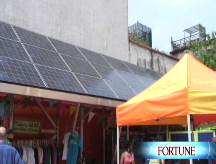A solar startup heads to rainy Wales
California entrepreneur Bob Hertzberg picked a dark, overseas spot to house his bright idea.
CARDIFF (Fortune Small Business) -- Bob Hertzberg's audience seems as muted as the dismal gray skies outside.
The attendees are pale, polite civil servants. The location is a conference room in Wentloog, a rainy industrial town outside Cardiff, the capital of Wales. These 16 Welsh officials have come to hear California native Hertzberg preach the gospel of solar energy. The brightest splash of color in this room (if not all Wentloog) is the scarlet cable-knit sweater that Hertzberg wears as he enters.
At six feet and 230 pounds, Hertzberg would be hard to miss in any room. He still radiates the charisma of the California politician he used to be. Back in Sacramento he was nicknamed "Huggy Bear" for his tendency to embrace everyone he met. (Governor Arnold Schwarzenegger, whose transition team Hertzberg helped to manage, calls him "Hertzie.") Hertzberg served as Speaker of the California Assembly during the electricity crisis of 2002, when Enron squeezed favorable contracts out of the state by choking off its power supply. That debacle left him passionate about the importance of renewable energy. And a failed primary campaign for mayor of Los Angeles left Hertzberg in need of a new career.
So he founded a solar-power company, G24i, and quickly became the most contrarian guy in the renewable energy business. Most of his rivals produce silicon solar panels for the first world. Hertzberg is building silicon-free solar strips, and says his earliest customers are in the developing world, especially Africa and India. Most solar companies seek government handouts; Hertzberg avoids them like the plague. And while few solar firms would think of bringing their product to a cloudy climate, Hertzberg set up his headquarters in Wales - in part to prove that G24i's technology can work anywhere.
Hertzberg talks to his audience as if he's still running for office. "So far, solar power has benefited rich people, governments and corporations," he declaims. "We're going to provide it for ordinary folks."
He explains that G24i's solar strips will fit on backpacks, computer cases and even purses. They will charge cell phones and other gadgets, even on a dreary day like this. Wales, a land once known for dirty coal mines, could host a clean-energy revolution. "We're telling the story of the transformation of Europe!" he bellows.
Based on this performance, you would never know that shares in solar-power companies were being pummeled in the global markets. First Solar, a G24i rival, saw its share price drop from a high of $311 to a low of $85 in 2008. The bear market was caused, ironically, by a strong year for production. Investors think solar producers are less likely to receive the government subsidies on which they've relied to date.
But Hertzberg has made a long-term commitment to solar power. G24i, with 66 employees, is sitting on $100 million in venture funding. It helps that Hertzberg co-owns the investment firm Renewable Capital, which partly bankrolled G24i. The only handout he received from the Welsh government went to building a fence around G24i's factory. Hertzberg's golden rule: "Don't rely on subsidies. You spend all your time and money lobbying government and filling in forms."
Hertzberg learned that lesson the hard way. In 2005, after his failed mayoral bid, he set up a firm called Solar Integrated Technologies in Watts, a blighted area of Los Angeles. The business model relied on job-creation subsidies. The company planned to sell solar panels that could be built into walls and roofs. On the day that Solar Integrated Technologies received a large shipment of equipment, the city canceled its job-creation program - forcing Hertzberg to rip up stacks of contracts. The company was doomed.
Though a lawyer by training, Hertzberg has little patience for red tape. As a California state lawmaker, he drafted legislation designed to reduce the regulatory burden on green-energy startups. But it wasn't enough.
"The government loves its cockamamie forms," Hertzberg says. "With all the money and time it took us to go through the regulatory maze, we were basically chased out of the country."
To his surprise, Hertzberg found less onerous regulations in Europe. Thanks to carbon-emission cuts mandated by the 1998 Kyoto accords, many European governments are keen to attract renewable energy companies. In 2006, Hertzberg heard about a disused factory in Wales. Acer Computers commissioned the facility but didn't take full occupancy because of corporate cutbacks. Hertzberg had never been to Wales, but he figured it was close enough to London - two hours by train - that he could tap the British capital's glut of green investment funding. Also, he wouldn't have to compete for cash and attention with scores of solar companies on the European mainland.
-
The Cheesecake Factory created smaller portions to survive the downturn. Play
-
A breeder of award-winning marijuana seeds is following the money and heading to the U.S. More
-
Most small businesses die within five years, but Amish businesses have a survival rate north of 90%. More
-
The 10 most popular franchise brands over the past decade -- and their failure rates. More
-
These firms are the last left in America making iconic products now in their twilight. More














